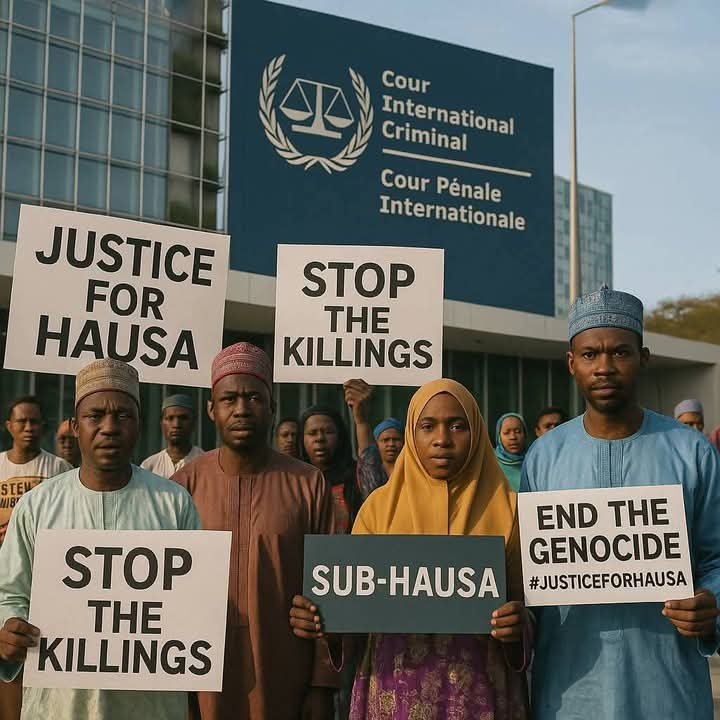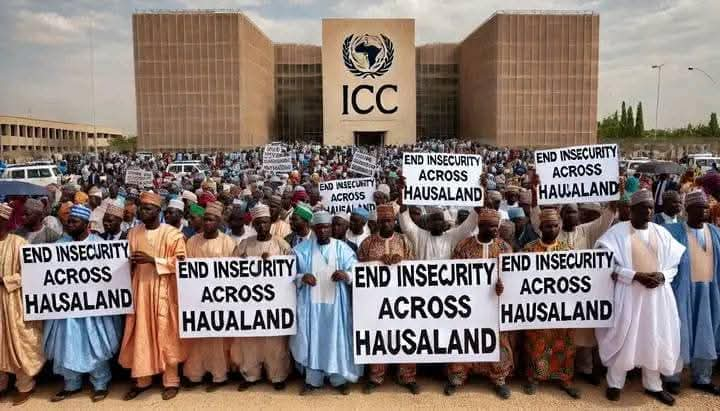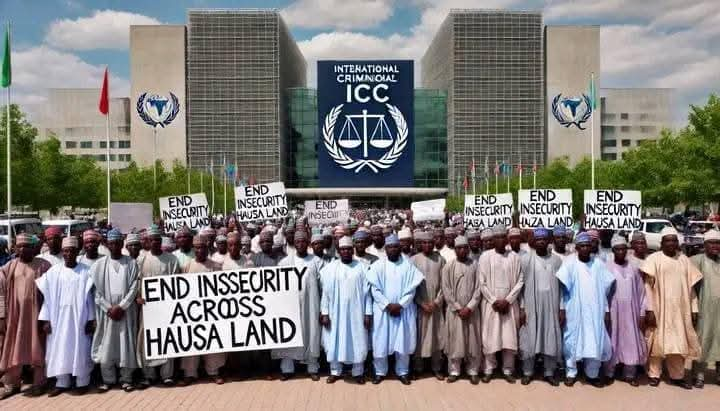April 22, 2025
The Hausa Native Advancement and Development Initiative has submitted a petition to the International Criminal Court (ICC) alleging grave violations of international law against the Hausa ethnic group in Northern Nigeria.
The petition claims that armed Fulani militias have carried out coordinated attacks on Hausa towns and villages, resulting in indiscriminate killings, mass rapes, abductions, and enforced displacement of civilian populations.
The group accuses the Nigerian state of complicity and failure to protect its citizens, and urges the ICC to open a preliminary examination into the situation
The Petition Reads
Open Letter to the International Criminal Court (ICC): The Plight of the Hausa Ethnic Group
To the Esteemed Members of the International Criminal Court,
Subject: Urgent Appeal Regarding Grave Violations of International Law Against the Hausa Ethnic Group in Northern Nigeria
To the Honourable Prosecutor and Esteemed Officials of the International Criminal Court,
We, representatives of the Hausa Native Advancement and Development Initiative, acting on behalf of the victims and survivors within the Hausa communities across Northern Nigeria, respectfully submit this petition invoking the jurisdiction of the Court under the Rome Statute, particularly Articles 5, 6, and 7, regarding acts constituting crimes against humanity and, potentially, genocide.
It is with profound sorrow, yet with unyielding resolve, that we bring to your attention the systematic, large-scale atrocities perpetrated against the Hausa ethnic group—atrocities which, in our considered view, fulfill the definitional thresholds established under international criminal law.
I. Constitutive Elements of Crimes Against Humanity and Ethnic Cleansing
As defined under Article 7 of the Rome Statute, crimes against humanity include “murder, extermination, deportation or forcible transfer of population, persecution against any identifiable group or collectivity on political, racial, national, ethnic, cultural, religious or gender grounds.” The documented atrocities targeting the Hausa population satisfy these elements through their widespread and organized nature.
Over the past decade—and with intensifying frequency in recent years—numerous Hausa towns and villages have been the targets of coordinated attacks by armed Fulani militias. These operations are not isolated incidents of rural insecurity. They constitute a discernible pattern of deliberate ethnic targeting: indiscriminate killings, mass rapes, abductions, the razing of entire communities, and the enforced displacement of civilian populations. The destruction is often accompanied by statements and practices evincing clear intent to eliminate the Hausa presence in the region.
In accordance with General Recommendation XXII of the UN Committee on the Elimination of Racial Discrimination, the forcible displacement of ethnic populations and the appropriation of their land and property must be recognized as a gross violation of the right to security and self-determination.
II. State Complicity and the Duty to Prevent
The complicity of state actors is evident not only through omission but through active obstruction of justice. The Nigerian state has failed in its positive obligation under Article 2(1) of the International Covenant on Civil and Political Rights to protect the right to life and security of its citizens without distinction. Security forces have been repeatedly withdrawn, and military responses have been suspiciously absent in many areas affected by violence. Numerous reports suggest that elements within the security establishment have direct or indirect affiliations with the perpetrators.
Furthermore, public figures, including certain religious and political leaders from Fulani backgrounds, have not only failed to condemn these atrocities but have, in some cases, rationalized or justified them in public discourse. This amounts to incitement to violence under Article III(c) of the Genocide Convention, a crime in and of itself under international law.
III. Evidentiary Threshold and Jurisdictional Grounds
We submit that the threshold for the preliminary examination under Article 15 of the Rome Statute has been met. Our documentation includes but is not limited to:
Photographic and satellite evidence of destroyed communities and mass graves
Survivor testimonies collected under oath
Verified reports from humanitarian agencies and local monitors
Names of implicated individuals in command positions within state and non-state structures
This Court has jurisdiction ratione materiae, ratione temporis, and ratione loci over these crimes, and Nigeria, as a State Party to the Rome Statute, has an obligation to cooperate fully in any investigation or prosecution initiated by the Office of the Prosecutor.
IV. Prayer for Action
We respectfully urge the International Criminal Court to:
- Open a Preliminary Examination into the situation in Northern Nigeria with particular attention to the targeting of the Hausa ethnic group;
- Examine the command responsibility of state actors, local elites, and religious influencers involved in the incitement, facilitation, or concealment of these crimes;
- Classify these acts under the legal definitions of crimes against humanity, and consider the threshold of genocide as per Article 6 of the Rome Statute;
- Ensure that victims and survivors receive reparation, as provided under Article 75 of the Rome Statute, including restitution, compensation, and guarantees of non-repetition;
- Call upon the Nigerian government to fulfill its international obligations under customary international law and the treaties to which it is party.
V. Conclusion: A Call to Uphold the Promise of International Justice
The ongoing ethnic cleansing of the Hausa people is a stain on the conscience of humanity. The Universal Declaration of Human Rights declares in its preamble that “disregard and contempt for human rights have resulted in barbarous acts which have outraged the conscience of mankind.” This is our plea: that the conscience of this Court be stirred to action.
We stand as witnesses to a systematic attempt to erase an entire ethnic group. In the name of all victims, and in defense of the principles upon which this Court was founded, we plead that you act now.
Justice delayed is not only justice denied; it isp complicity in ongoing crime.
Respectfully submitted,
Source: Facebook || Gimbiyar Hausa


